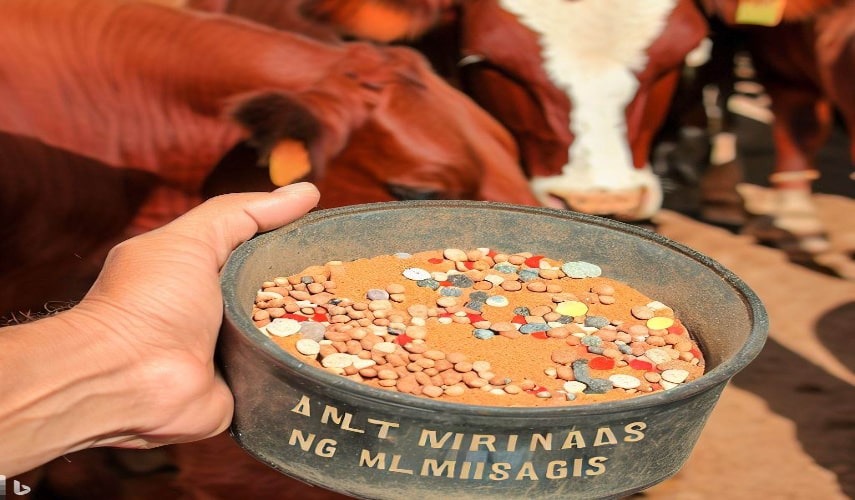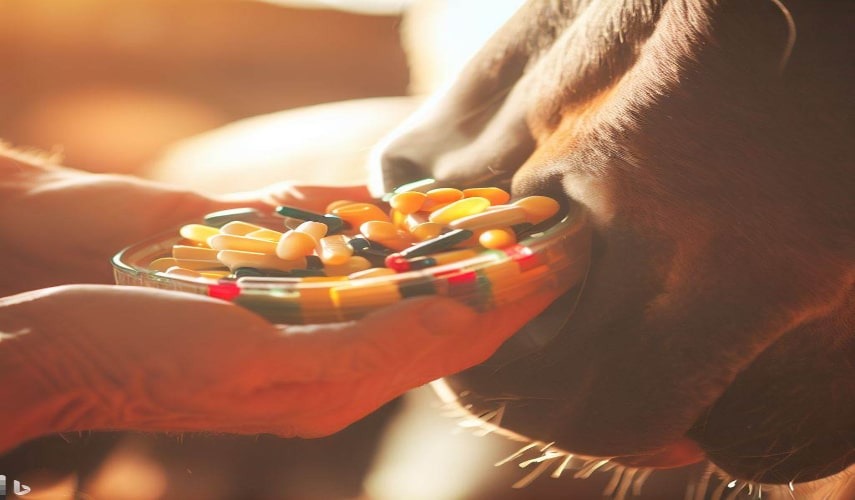Vitamins and minerals for cattle as well as other livestock are important. Cattle play a vital role in our agricultural industry, providing us with meat, dairy products, and by-products used in various industries. To maintain the health and productivity of these valuable animals, a well-balanced and nutritious diet is essential. In addition to macro nutrients like carbohydrates, proteins, and fats, cattle require a range of essential minerals and vitamins to support their growth, reproduction, immune function, and overall well-being. In this article, we will explore the importance of these key nutrients and their role in maintaining the health and vitality of cattle.
Most necessary vitamins and minerals for cattle are:

Minerals for Cattle
Minerals are essential nutrients that play a vital role in the overall health and productivity of cattle. They are involved in various physiological processes, including bone development, muscle function, enzyme activity, immune response, and reproduction. While cattle can obtain minerals from forage and feed sources, deficiencies or imbalances can occur, leading to significant health issues. Therefore, it is crucial for cattle farmers to understand the importance of minerals in the diet and ensure proper supplementation to meet their animals’ needs. Now, we will explore some of the key minerals necessary for a healthy cattle diet.
Calcium
Calcium is one of the most critical minerals required for cattle. It is essential for skeletal development, muscle contraction, blood clotting, and nerve function. Cattle obtain calcium primarily from forage sources such as grass and legumes. Dairy cows, in particular, have higher calcium requirements due to the demands of milk production. Insufficient calcium intake can lead to milk fever, weak bones, reduced milk production, and reproductive problems. It is important to provide calcium-rich supplements, especially during the prepartum and early lactation periods, to prevent deficiencies and maintain optimal health. It is interesting to note that the premium animal feed known as Concentrate CP-11, provided by SUDCCO, contains a calcium content of 1.05%.
Phosphorus
Phosphorus works in conjunction with calcium to support bone formation, energy metabolism, and proper functioning of enzymes and DNA. It is essential for overall growth, reproduction, and milk production in cattle. While phosphorus is naturally present in many feedstuffs, its availability can vary. Therefore, balancing the calcium-to-phosphorus ratio is crucial to avoid imbalances that can negatively impact skeletal health and productivity. Supplementation with phosphorus sources may be necessary, especially when forages are low in phosphorus or the dietary ratio is imbalanced.
Magnesium
Magnesium is involved in enzyme activation, energy metabolism, nerve function, and muscle contraction. It is particularly important for preventing grass tetany, a metabolic disorder that can occur when cattle graze on magnesium-deficient pastures. Signs of magnesium deficiency include muscle tremors, staggering, and convulsions. Providing magnesium supplements, especially during periods of rapid growth or when grazing on magnesium-deficient forage, is crucial to prevent deficiencies and maintain overall health
Potassium and Sodium
Potassium and sodium are essential minerals that play a significant role in maintaining proper fluid balance, nerve function, and muscle activity in cattle. They are commonly referred to as electrolytes. Cattle obtain potassium and sodium through their diet, primarily from forages and commercial feeds. Imbalances in potassium and sodium levels can lead to dehydration, reduced appetite, and poor milk production. Ensuring an adequate supply of these minerals is crucial for maintaining optimal health and productivity.
Iron
Iron is an important mineral involved in oxygen transport and metabolism. While cattle obtain a significant amount of iron from forage and feed sources, deficiencies can still occur, particularly in young calves. Iron supplementation may be necessary to prevent anemia and support healthy growth. However, excessive iron supplementation can lead to toxicity, so it is important to monitor and balance iron levels in the diet.
Trace Minerals
In addition to the major minerals mentioned above, cattle also require trace minerals in smaller quantities. These include copper, zinc, selenium, manganese, iodine, and iron, among others. Trace minerals are involved in various metabolic processes, enzyme function, immune response, and reproduction. Deficiencies or imbalances in these trace minerals can result in reduced growth rates, impaired immune function, poor reproductive performance, and other health issues. Providing appropriate supplementation and ensuring a balanced diet that meets the specific needs of the herd is essential for preventing trace mineral deficiencies
Chloride: important for maintaining proper fluid balance and acid-base balance
Zinc: important for immune function, wound healing, and reproductive health
Copper: necessary for iron metabolism, immune function, and connective tissue formation
Manganese: important for bone development, carbohydrate metabolism, and reproductive health
Selenium: important for immune function and reproductive health
Discover the mineral content of SUDCCO‘s high-quality animal feed, Known as Khotan.
Discover the mineral content of SUDCCO‘s high-quality animal feed, Known as Khotan.

Vitamins for Cattle
Vitamins are essential organic compounds that play a crucial role in the overall health, growth, and productivity of cattle. While cattle can synthesize certain vitamins within their bodies or obtain them from forage and feed sources, there are instances when supplementation is necessary to meet their specific nutritional requirements. In this article, we will explore the importance of vitamins in the cattle diet and highlight some key vitamins that are essential for their well-being.
Vitamin A
Vitamin A is vital for vision, immune function, growth, and reproductive health in cattle. It is involved in the maintenance of epithelial tissues, such as the skin and respiratory and gastrointestinal tracts, serving as a barrier against pathogens. Vitamin A is primarily obtained from green forages such as fresh grass and legumes. However, during periods of low-quality pasture or winter months, when fresh forage is limited, supplementation may be necessary. A deficiency in vitamin A can lead to reduced growth, impaired vision, increased susceptibility to infections, and reproductive disorders.
Vitamin D
Vitamin D is essential for calcium and phosphorus absorption, bone development, and immune function. Cattle can synthesize vitamin D when their skin is exposed to sunlight. However, animals that are confined indoors or have limited access to sunlight may require additional supplementation to prevent deficiencies. Inadequate vitamin D levels can result in rickets, weak bones, poor growth, and compromised immune response. Providing vitamin D supplements or ensuring access to sunlight is crucial for maintaining optimal bone health and overall well-being.
Vitamin E
Vitamin E is an antioxidant that helps protect cell membranes from oxidative damage and supports immune function. It plays a crucial role in muscle development and function. Vitamin E deficiencies can lead to various muscular disorders, such as white muscle disease, characterized by muscle weakness and degeneration. Additionally, vitamin E is essential for reproductive health and the proper functioning of the nervous system. While cattle can obtain vitamin E from fresh green forages, supplementation may be necessary during periods of limited access to pasture or when the diet is deficient in vitamin E-rich sources.
Vitamin K
Vitamin K is an important nutrient that plays a crucial role in blood clotting and bone metabolism in cattle. It is essential for the synthesis of clotting factors in the liver, which are necessary for proper blood coagulation. Additionally, vitamin K is involved in the regulation of calcium in the body, aiding in bone formation and maintenance. While cattle can produce some vitamin K through microbial synthesis in the rumen, supplementation may be required to meet their optimal requirements.
B Vitamins
The B vitamins, including thiamine (B1), riboflavin (B2), niacin (B3), pantothenic acid (B5), pyridoxine (B6), cobalamin (B12), and folic acid, are essential for energy metabolism, enzyme function, and the production of red blood cells. These vitamins are crucial for the growth, reproduction, and overall health of cattle. While B vitamins are synthesized by rumen microorganisms in the rumen of cattle, there are instances when supplementation is necessary. For example, during periods of stress, such as weaning or transportation, additional B vitamin supplementation may be beneficial to support the animal’s immune system and overall well-being.
A note from SUDCCO
To maintain the health, productivity, and well-being of cattle, providing a well-balanced diet that includes essential vitamins and minerals for cattle is crucial. Proper supplementation and feed management can help prevent deficiencies, enhance growth, reproductive performance, and overall immunity in the herd. Consulting with a veterinarian or nutritionist to formulate the optimal diet based on specific breed, age, and production stage of the cattle is highly recommended. By prioritizing the nutritional needs of cattle, farmers can ensure a healthier and more productive herd, contributing to a thriving agricultural industry.
FAQs
How can I determine if my cattle are deficient in specific vitamins or minerals
To determine if your cattle are deficient in specific vitamins or minerals, several methods can be employed:
Consultation with Experts
Diagnostic Testing
Clinical Signs
Body Condition Scoring
Review of Feed and Forage Analysis
By combining these approaches and working with experts, you can accurately assess your cattle’s vitamin and mineral status. This information will enable you to make informed decisions regarding appropriate supplementation or adjustments to their diet to address any deficiencies and maintain their overall health and well-being.
Are there any natural sources of vitamins and minerals that I can incorporate into my cattle’s diet?
Yes, there are natural sources of vitamins and minerals that can be incorporated into your cattle’s diet. For vitamins, fresh green forages, such as grass and legumes, are excellent sources of vitamins A and E. Additionally, certain oilseeds like sunflower seeds and soybeans can provide vitamin E. Vitamin D can be synthesized by cattle when their skin is exposed to sunlight.
When it comes to minerals, various forage sources can be rich in essential minerals. Legumes like alfalfa and clover tend to have higher mineral content compared to grasses. Additionally, minerals can be present in certain feed ingredients like grains and oilseeds. Consultation with a nutritionist or veterinarian and analyzing the nutrient composition of forage and feed sources can help identify specific natural sources of vitamins and minerals to incorporate into your cattle’s diet.
Are there any interactions between different vitamins and minerals that I should be aware of?
Yes, there can be interactions between different vitamins and minerals that you should be aware of. One common interaction is between calcium and phosphorus. These minerals work together, and an imbalance in their ratio can lead to health issues. It is important to maintain an appropriate balance between calcium and phosphorus in the diet to ensure optimal absorption and utilization by the animal.
These interactions highlight the importance of formulating a balanced diet that considers the ratios and interactions between various vitamins and minerals. Consulting with a veterinarian or nutritionist can help ensure that the diet is properly formulated to meet your cattle’s specific needs and minimize any potential interactions or imbalances.
Are there specific vitamins and minerals that are more critical during certain stages of production (e.g., pregnancy, lactation)?
During pregnancy, vitamins and minerals that support fetal development and the cow’s reproductive health become particularly important. These include vitamin A, vitamin E, calcium, phosphorus, and trace minerals such as copper, zinc, and selenium. Adequate levels of these nutrients are crucial for proper fetal growth, immune function, and overall reproductive performance.
During lactation, the demand for nutrients increases significantly due to the production of milk. Vitamins and minerals that support milk production, such as calcium, phosphorus, vitamin D, vitamin E, and trace minerals like copper and zinc, become especially critical. Meeting the increased nutritional requirements during this stage is essential to support optimal milk production, calf growth, and the cow’s overall health

